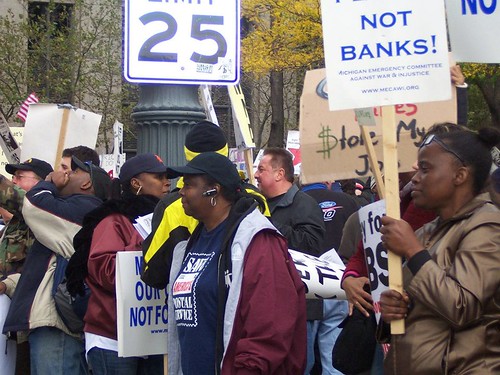
Thousands demonstrated in downtown Detroit on October 14, 2011 against the role of the banks in the economic crisis. Many have occupied Grand Circus Park since the march. (Kris Hamel), a photo by Pan-African News Wire File Photos on Flickr.
latimes.com/business/la-fi-bernanke-economy-20120301,0,3412523.story
latimes.com
Fed chairman warns of only modest U.S. growth for rest of 2012
Ben S. Bernanke, in a report, cites housing market woes and other issues. He also says Fed policymakers do not expect 'further substantial declines' in the jobless rate this year.
By Don Lee, Los Angeles Times
March 1, 2012
Reporting from Washington
U.S. consumers and the economy started the year with more financial pep than previously thought, but Federal Reserve Chairman Ben S. Bernanke cautioned that economic growth probably would be modest through the rest of this year.
The nation's recovery from the brutal recession has been "uneven and modest," the Fed chief told Congress on Wednesday, and is being hampered by tight credit for borrowers, a depressed housing market, budget-strapped governments and uncertainties in resolving the European sovereign debt crisis.
Bernanke, in presenting his semiannual report on monetary policy and the economy, acknowledged recent improvement in the labor market, including the nearly 260,000 private-sector jobs added in January.
But he said that Fed policymakers did not expect "further substantial declines" in the jobless rate this year and that the sharp drop in the unemployment rate to 8.3% in January from 9.1% last August was somewhat out of sync with the moderate pace of growth.
"The job market remains far from normal," he told the House Committee on Financial Services. He said he remains especially concerned about near-record numbers of the long-term unemployed, whose skills tend to erode over time.
Bernanke had a more sanguine view of the recent increase in oil prices, which he said will pinch consumer pocketbooks, but only temporarily. He said inflation over the long haul probably will remain subdued, presumably at or below the Fed's 2% target.
He blamed the jump in crude prices on supply constraints stemming from tensions with Iran and elsewhere, but declined to say whether the U.S. should dip into the nation's strategic oil reserves, as some Republicans in Congress have urged.
Bernanke's remarks didn't seem to inspire confidence on Wall Street. The Dow Jones industrial average opened moderately higher after breaking through 13,000 the day before, but then retreated. It closed down 53.05 points at 12,952.07.
Kevin Cummins, an economist at UBS Investment Research, said investors might have been hoping Bernanke would suggest that further monetary stimulus was on the way. But the Fed chief gave no such hint.
Investors were cheered earlier by a Commerce Department report that showed economic output in the fourth quarter grew at a 3% annual rate, slightly higher than the 2.8% initially estimated. Gross domestic product, the broadest measure of economic output, increased at a 1.8% pace in the third quarter.
More significantly, officials revised sharply upward their data on personal income. The new report said that inflation-adjusted, after-tax incomes rose 0.7% in the third quarter, as opposed to shrinking 1.9% as previously thought. Incomes rose 1.4% in the fourth quarter, nearly double the first estimate.
With the higher income figures, the fourth-quarter personal savings rate — what's left after taxes and expenses — was revised to 4.5% from 3.7%.
"As a result, household finances look to be on a much firmer footing than we were previously led to believe," Paul Ashworth, chief U.S. economist at Capital Economics, said in a research note.
The Commerce Department's GDP report was released after the Fed had prepared its monetary and economic report.
In his prepared remarks to lawmakers, Bernanke cited flat household income and wealth last year as among the factors for the continuing weak "fundamentals" that support spending. Consumer spending accounts for more than two-thirds of U.S. economic activity.
Final sales, which measure actual demand, rose slightly more than 1% in the fourth quarter, the Commerce report said. The bulk of the GDP growth came from an inventory buildup, as companies increased their stockpiles amid signs of stronger demand.
But a bigger-than-usual increase in inventories in one quarter tends to lead to slower activity in the next. Fed policymakers are projecting GDP growth of 2.2% to 2.7% this year.
That moderate pace isn't likely to bring down the unemployment rate much, assuming that productivity and the workforce population grow at average rates and more of the unemployed flood back into the job market.
Looking ahead, one of the biggest drags on the economy is budget-strapped governments. In the fourth quarter, reduced government spending sliced the GDP growth rate nearly a full percentage point.
Meanwhile, business spending remained solid and manufacturing was robust.
The Fed's so-called beige book released Wednesday showed factory output expanding at all 12 of its banking districts and signs of life in the housing market in most districts. On the whole, the report pointed toward an economy growing at a modest to moderate pace in January and early February.
As in his past appearances before Congress, Bernanke was caught in partisan wrangling over whether the Fed should focus on shrinking the nation's deficits or stimulating the economy.
Bernanke reiterated that it was important for Congress to develop a credible budget plan to bring down the nation's debts without snuffing out the recovery.
Under current law, "there's going to be a massive fiscal cliff of large spending cuts and tax increases" next Jan. 1, he said, referring to the scheduled expirations of the Bush-era tax cuts and the payroll tax holiday, among other things.
"I hope that Congress will look at that and figure out ways to achieve the same long-run fiscal improvements without having it all happen in one day," he said.
don.lee@latimes.com
No comments:
Post a Comment